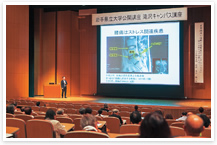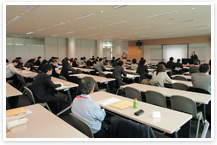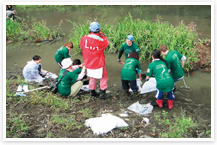- Topic1:Joint Research and Development With Local Corporations, etc.
Applying the University’s Research Activities, Knowledge and Human Resources for the Growth of Local Industries - Topic2:Support for the Earthquake Disaster Reconstruction Efforts and Research of Reconstruction Issues.
Providing Support for Reconstruction as a Local University by Closely Bonding With Disaster Stricken Areas
Iwate Prefectural University is making efforts to promote research interaction with local industries and collaborate with companies in the region. We will describe cases of regional collaborations and joint research from the 2011 to 2012 academic years.

Conceptual Diagram: “Iwate – A Center for the Development of Next Generation Mobility Technology that is Friendly to the Environment and Local Community”
Iwate Prefectural University is striving to become an institution that contributes to the vitality of the local community. We are working towards this goal by engaging in activities such as conducting research coordinated with industrial, academic and governmental bodies to establish the university as Iwate’s knowledge, strengthening the school’s functions as a think tank that works to resolve local issues, and releasing research results to the citizens of the prefecture.
The Iwate Monozukuri and Software Integration Technology Center (i-MOS) and the Regional Policy Research Center were established in April 2011 within the Regional Cooperation Head Office. The two organizations are working towards the creation of new industries in Iwate and the resolution of regional issues.
In addition to previous regional cooperative endeavors, there is also the Next Generation Vehicle Development Center Creation Project, proposed jointly by Iwate Prefectural University, industrial, academic and governmental bodies in Iwate, and prefectural financial institutions. It was selected in 2012 to be supported by the Regional Innovation Strategy Support Program (Earthquake Disaster Reconstruction Support Type) run by the Ministry of Education, Culture, Sports, Science and Technology. This endeavor aims to create sustainable development in the field of innovation and reconstruction via the cultivation of engineers needed for the development of next generation vehicles that use ICT technology and the establishment of the region as an industrial center for the research and development of parts and products. With the financial support of the nation, the project will move forward centering on three major endeavors to be developed over the next five years from 2012 to 2016: the research and development of ICT technology, the development and implementation of human resource cultivation programs, and the opening of the research facility (i-MOS).
We are also enthusiastically advancing joint research projects involving the local community. In November 2011 we began the sale of “Okaran”, a bread product made out of tofu refuse, jointly developed by Morioka Junior College, a pharmacy in Kuji City, and Yamagata University. The project was realized based on a request by Kuji City that was put through the Regional Cooperation Head Office and executed with the cooperation of Morioka Junior College to conduct research. We aimed for the creation of a low-calorie staple food that uses domestic tofu refuse, which is high in nutritional value. Through a process of trial and error that involved the conceptualization of the product and setting of the product target market, shape, taste, caloric value and nutritional value, we succeeded at creating a bread product that is only 55 calories per 2 pieces and goes well with both Japanese and Western dishes.
At Iwate Prefectural University, we will continue to push forward with endeavors that broaden our coordination with local corporations and self-governing bodies, and create regional vitality for Iwate.

Associate Professor Takako OTOKI (center), who handled the development of Okaran, a bread product made out of tofu refuse, together with dieticians from the corporation involved in the joint research

Okaran was developed with careful consideration of taste and nutritional value, as well as calorie count
At Iwate Prefectural University, we have been providing generous support for damage caused by the Great East Japan Earthquake and Tsunami that occurred on March 11, 2011, and pushing forward with research and other initiatives to contribute to reconstruction. Introduced below are endeavors we are taking on to march together with the citizens of Iwate towards reconstruction.
In order to pass on the results of the university’s education and research as well as to respond to the educational needs of the citizens of Iwate, we will be holding a total of 8 extension lectures that address the experience of the 2011 Great East Japan Earthquake and Tsunami and issues related to earthquake disasters. This lecture series will be hosted under the theme, “A Shared Future of Iwate – The Hopes of Reconstruction Lead to the Creation of Tomorrow”. We will be providing an opportunity for Iwate to collectively reflect on its future through panel discussions that cover subjects such as disaster victim support, attitude survey reports, and industrial economic issues.
Disaster reconstruction research, conducted since 2011 by the Disaster Reconstruction Research Department belonging to the Regional Policy Research Center, has allowed for the promotion of reconstruction research while opening up the possibility of joint research with other universities on each project and providing advice, etc. on reconstruction plan drafts and other matters. In July 2012 the research project published an interim report package that summarized all of the research that was conducted up to that point. Research will continue in the lifestyle field by examining the reconstruction of living standards through connections within the local community, in the industrial economy field by researching the reconstruction of the industrial economy by taking into account the characteristics of the region, and in the local community and infrastructure field by studying disaster-resistant city planning and infrastructure.
The Disaster Reconstruction Support Center, established in April 2011 as a rehabilitation and reconstruction support institution, continues to support activities that take advantage of the expertise of our various departments and faculty, as well as volunteer activities such as the operation of volunteer buses through the participation of our students and faculty. Further, for the purposes of operating a system that can provide broad reconstruction support, we coordinate with the Student Volunteer Center that is active in the Iwate Ginga-Net Project, which brings student volunteers across the country to Iwate in order to support the formation of communities in disaster-stricken areas.
As a university based in a disaster-stricken area, the Iwate Prefectural University will sustain support in the hopes that disaster reconstruction will happen as quickly as possible.

The 2012 extension lecture series (September 2012, at Takizawa Campus Lecture Hall)

A reconstruction research briefing session
(January 2012, Aiina – Iwate Citizen Information Exchange Center)

Volunteer activities conducted jointly with students from Ohio University
(September 2011, at Otsuchi Town and other locations)




